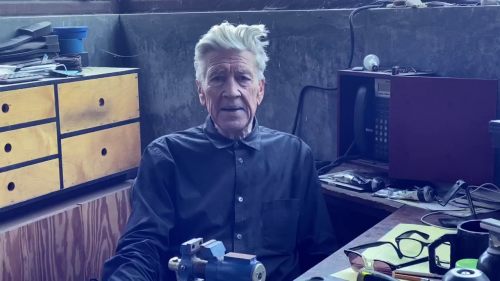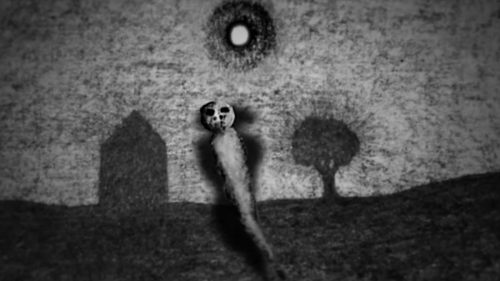An Interesting Contusion: TWIN PEAKS: FIRE WALK WITH ME At 25
Through the darkness of future past
The magician longs to see.
One chants out between two worlds
Fire walk with me.
Teresa Banks is just another dead girl. A seventeen-year-old prostitute and coke fiend, her body’s found floating in a river near Deer Meadow, Washington, all wrapped in plastic. Why the FBI cares about this slain teenage drifter is another question entirely, as FBI Supervisor Gordon Cole (David Lynch) calls in Agent Chester Desmond (Chris Isaak) to investigate, letting him know (via dancing interpreter) that this is one of his precious “Blue Rose” cases. Desmond understands what the flower symbolizes, but he cannot disclose this information to his new partner, Sam Stanley (Kiefer Sutherland), who anxiously accepts the senior agent’s awareness with jittery resignation. Yet their investigation won’t last more than a day, as Desmond disappears after discovering an emerald ring underneath one of the mobile homes in the Fat Trout trailer park – a piece of jewelry that left a line of cleanliness around Banks’ finger when he and Sam first examine the body.
Meanwhile, in the Philadelphia field office, Cole and Agent Cooper (Kyle MacLachlan) are visited by the long lost Phillip Jeffries (David Bowie). Cooper tells Cole that today is a day they should be anxious about – as he’d dreamt of frozen doppelgangers caught on security cameras on this date. Jeffries begins ranting and raving about spirits he witnessed while on assignment, whom viewers of Twin Peaks (and now The Return) know to be BOB (Frank Silva), The Man From Another Place (Michael J. Anderson), Chalfont (Frances Bay), her masked grandson (Jonathan J. Leppell), the “Jumping Man” (Carlton Lee Russell), and the infamous Woodsman (Jürgen Prochnow). Jeffries dematerializes before Cole and Cooper’s eyes, and Gordon receives a phone call informing him that Desmond’s vanished without a trace. When Cooper travels to Deer Meadow, all he finds is a large sedan, with the words “Let’s Rock!” written on the windshield in gaudily mocking cursive. The Black Lodge is luring them in – a fact we as the audience comprehend, but is lost on the FBI’s best due to this picture’s chronological playfulness.
It’s not difficult to comprehend why Twin Peaks: Fire Walk With Me frustrated many fans upon its initial release in August 1992. Not only was their beloved series unceremoniously canceled following its creator’s abandonment, leaving numerous central mysteries (such as Cooper being stuck in the nefarious Lodge) left hanging, now they were being greeted with a new tale set one year before the brutal murder of prom queen Laura Palmer (Sheryl Lee). Who the hell is this Chet Desmond? Why the hell is David Bowie screaming about some woman named Judy? Why the hell is there another butchered girl exactly one year before Laura’s tragic demise? The fact that the opening thirty-three minutes are barely even commented upon for the rest of the film – as Lynch opts instead to jump ahead on the calendar to showcase Laura’s last days in the titular town – is a decision as oblique and head-scratching as any in his already mystifying body of work. It felt like a blatant “fuck you” denial of resolution for an entire audience, who were already let down by the ABC soap’s lack of solutions to its many enigmatic riddles.
Truth be told, it’s also not difficult to see why Lynch felt zero obligation to explain himself to these folks at all. Even taking into account the idiosyncratic auteur’s disdain for any sort of post-picture elucidation (Lynch recently stated he hates talking about films after he sees them because “the movie is the conversation”), he reportedly made Fire Walk With Me as a means to revisit his doomed princess one last time. Lynch was in love with Laura Palmer – the ostensibly perfect young woman on the outside who was rotting away to her core on the inside. To see her walk, talk and emote meant the world to him. But in typical Lynch fashion, that also meant Laura had to suffer, as he delved yet again into the “evil that men do” spirit of BOB, as he takes possession of Laura’s father (Ray Wise) and causes him to violate her for the sake of cheap sex. Setting the movie before the series’ events meant that their ambiguities could and would wait, and never calling back to the new secrets introduced in the prologue only further reinforced that modus operandi. Fire Walk is about pain and the sweet release from its prison, nothing more.
In fact, the first half hour of Fire Walk With Me now plays like rambling preamble to a show that wouldn’t premiere for almost three decades, when The Return finally explores Phillip Jeffries and the Blue Rose Task Force. The remaining one hundred are the equivalent of David Lynch’s Halloween (’78), where an unstoppable evil invades this idyllic municipality from inside its houses, tearing the clothes from its daughters and leaving them in the river for fisherman to find. Fire Walk With Me is one of the most brutal and uncompromising portraits of a rape victim ever put to the screen, as Sheryl Lee throws herself into the iconic character in a way she never got a chance to in the original Twin Peaks (beyond minor flashback appearances). Her downward spiral toward death’s door is often upsetting and hard to watch, but is also the most purposefully angelic in Lynch’s grotesque collection of broken dolls.
From the opening guitar lick of Angelo Badalamenti’s now instantly recognizable theme, we’re welcomed back to Twin Peaks alongside Laura as she makes her way to class, meeting up with Donna (Moira Kelly, standing in for a scorned Lara Flynn Boyle) along the way. But this isn't the Washington suburb we knew from the series’ two seasons; rather, it feels like the slasher movie alternate dimension take on Twin Peaks. The town’s veil of safety is threatening to fall at any moment, as Laura's multiple admirers – coke dealing Bobby (Dana Ashbrook) and sensitive bad boy James (James Marshall) being the top two suitors – circle 'round like wolves, ready to rip the girl to spiritual pieces once she emerges from that bathroom stall, a little white powder dotting her flawless beak. Like Lynch's Blue Velvet ('86), it’s all an artifice of illusion, hiding a den of warring vermin beneath the town’s surface. Laura’s the beating heart of this sleepy ‘burg, and if she falls, so will it.
"Do you think that if you were falling in space... that you would slow down after a while, or go faster and faster?" Donna asks once the day is done, turning the conversation away from Laura's boy toys and to something ostensibly innocuous. Nevertheless, a darkness falls over the prom queen’s orbs as she hypnotically replies: "faster and faster. And for a long time you wouldn't feel anything. And then you'd burst into fire. Forever...and the angels wouldn't help you, because they've all gone away." Unbeknownst to Donna, Laura's describing her everyday existence via one cryptic passage, as she stares at the ceiling with crystal blue eyes, as if searching for a sign of rescue that she knows in her soul will never come. The tips of wings taunt her from the art on her bedroom walls. There is nothing left for her here, so why can’t God just take her away? Lynch has always been a not so secret spiritualist with his cinema, and the desire for divine intervention is clear in the girl’s destitute gape.
Pages have been ripped from Laura’s secret diary, and only BOB could've been the one who knew where to find the book. Laura confesses her assaults to nebbish do nothing Harold (Lenny von Dohlen): BOB's been having her every night since she was twelve. Harold tells her that BOB isn't real, but this is the sort of denial a sexual assault victim goes through on the regular, and Laura results to extreme histrionics to get her point across, saying that BOB just doesn't want to fuck her, he wants to be her, causing the girl to live in fear every second of her days. The evil manifestation is out to consume all goodness (as the Log Lady [Catherine E. Coulson] will later explain in her passing cameo), and when his fire starts, it's near impossible to put out. The trickiest bit of this subtext is the loss of Laura’s identity, as she begins to give into her darker nature and abandon the girl everyone thought they knew. Lynch is walking a tightrope with the character, boldly unafraid to tumble off at any second.
This being a Twin Peaks prequel, Lynch is wrapping all of these unnerving undertones in a bow of series mythology, as Cooper predicts to Albert (Miguel Ferrer) that Teresa Banks' killer will strike again, and that his victim will have blonde hair, be sexually active, and use drugs. Albert scoffs at him, saying he's just described half the high school girls in the country. But that's the beauty of Lynch's hyper-stylish pulp ostentatiousness -- he's utilizing trappings from the smash soap he masterminded with Mark Frost (who is notably absent from writing duties here, as Fire Walk’s script was co-written by Robert Engels) as a platform to make these grand, sweeping statements about American kids and they way abuse can irreversibly corrupt them. By the time Laura's in the Roadhouse, gyrating topless with two lumberjacks while Donna tries to keep up in this strobe-lit Hell, we know there's no turning back for our angel. She's just another victim, like the girl in the river, cocooned in cellophane so her beautiful body is preserved, even after her spirit is trapped in the Black Lodge.
None of this would work if it weren’t for Sheryl Lee, who gives the performance of a lifetime as Laura Palmer. This is a considerable challenge given what an enigma Laura was during the show’s run – nothing more than an exquisite corpse that an entire town cried over once the girl had gone away. Here, Laura’s on her last legs of sanity, having been abused and lied to since she was a little girl, nobody wanting to listen to her cries for help. But beneath all that pain and anguish is the shining star everyone idolized, hoping that their hometown celebrity would flee this nothing of a place and spread her wings elsewhere. Lee discovers the perfect balance between screaming rage and tarnished vulnerability that’s miraculous in how it shifts from scene to scene, but still feels like parts of a complete person. Her turn also adds a layer to the lie of Twin Peaks, as she’s nowhere near a purity object lost to abject evil, but a young woman who enjoyed sex and drugs before using them as an escape from the horrors she endured at the hands of her possessed papa.
Fire Walk With Me builds to a shattering crescendo that may the very best climax in the entirety of Lynch’s filmography. We know what’s coming in the final reel, but having to sit through Laura’s last minutes of mortality, crying and begging for mercy before being granted no such thing, is a special sort of punishment the auteur is doling out. By focusing so intensely on the “whys” behind Laura’s death, we’d forgotten that this was a living, breathing human being, not just a McGuffin driving our precious narrative. Lynch’s lingering on her smeared lipstick and mascara stained eyes is a hyper-specific specific reminder of the thoughtlessness of this crime. We need to feel as she did to fully understand the tragedy of Twin Peaks, and watching Laura gaze up at an angel as it finally reveals itself (or does it?) is hauntingly beautiful.
In 1992, many critics and fans rejected the darkness and depravity of Fire Walk With Me, feeling it was a betrayal of the show’s quirky tone (which only pops up occasionally during the movie’s 130+ minute runtime). Though when taken in with The Return twenty-five years later, it’s clear what Lynch was doing with his initial revisit following ABC’s rushed reveal of Laura’s killer, and the director’s subsequent desertion. These were all strains that’d been percolating in Lynch’s busy mind, and he needed to get them out onto celluloid ASAP, even if he wouldn’t come back to these mysteries for nearly three decades. So while Fire Walk With Me offers zero in terms of answers for the queries left hanging by the Season Two finale, it’s an act of undeniable catharsis for its creator, as he unloads a dump truck of psychic trauma before moving on from damn good coffee and cherry pie for a while. This blatant act of expectation defiance led the movie to be maligned before being re-evaluated years later, and now The Return finally allows us to contextualize this damaging piece of the puzzle, while bidding adieu to Lynch’s ultimate woman in trouble.



